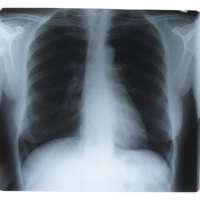Diabetes drug makes lung cancer vulnerable to radiotherapy

The diabetes drug metformin slows the growth of lung cancer cells and makes them more likely to be killed by radiotherapy, according to a study published in the British Journal of Cancer today.
Scientists from McMaster University in Canada found that metformin acted on the defence mechanisms that non-small cell lung cancers—the most common form of the disease—use to resist radiotherapy.
Lung cancer cells normally adapt to radiotherapy by switching on survival mechanisms that make them resistant to the treatment and even helps them to grow faster.
But, by studying lung cancer cells grown in the lab and in mice, the researchers found that metformin reverses this effect, once again making them sensitive to radiotherapy.
Importantly, the researchers used 'real life' levels of the drug in their experiments, similar to those already used for treating diabetes.
Metformin appears to work by enhancing the damage-detection signals sent within cancer cells in response to radiotherapy, over-riding the cells' survival mechanisms. These signals stops cancer cells from making the new proteins they need to grow rapidly, prevents them from making new cells and ultimately encourages them to die.
Dr Theodoros Tsakiridis, study author and a radiation oncologist at the Juravinski Cancer Centre and McMaster University, said: "Our study shows that the diabetes drug metformin can stop lung cancer cells from growing and makes them more sensitive to treatment by radiotherapy.
"We're now working with other institutions to develop a clinical trial that will investigate metformin in lung cancer patients treated with radiotherapy. If we can prove that this works in patients then we could have a potentially powerful weapon in the fight against the disease."
Around 42,000 people in the UK are diagnosed with lung cancer and almost 35,000 die from the disease each year. Despite radiotherapy being an effective treatment for many cancers, it has a limited effect for lung cancer patients.
Dr Kat Arney, science information manager at Cancer Research UK, said: "Lung cancer remains one of the most difficult cancers to treat, with less than 10 per cent of people surviving the disease for at least five years. We urgently need new and better ways of treating lung cancer and this research takes us a step towards making radiotherapy a more potent treatment.
"To improve the chances for lung cancer patients, Cancer Research UK is planning to increase significantly its investment in research into this form of the disease, so that patients can benefit from new and improved treatments sooner."
More information: Storozhuk, Y. et al Metformin inhibits growth and enhances radiation response of non-small cell lung cancer (NSCLC) through ATM and AMPK, British Journal of Cancer (2013). DOI: 10.1038/bjc.2013.187















